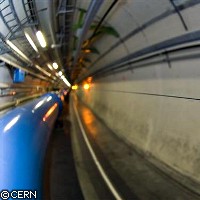Large Hadron Collider inaugurated
European Science and Research Commissioner Janez Potocnik was among the dignitaries present in Geneva, Switzerland, for the official inauguration of the Large Hadron Collider (LHC) at CERN on 21 October. Also on hand were French Prime Minister François Fillon, Swiss President Pascal Couchepin and numerous science ministers. 'Europe can be very proud to see that European scientists working together have been able to set up one of the world's most advanced physics experiments,' commented Mr Potocnik. 'This is a perfect illustration of what the European Commission is actively promoting in the area of research policy: enhance European scientific excellence and increase collaborative research between Member States, and between the EU and the rest of the world. Uniting brains will put the EU in the top position of scientific excellence.' The EU has long been a strong supporter of the LHC, which has received funding from the infrastructures and research mobility budget lines of the Sixth and Seventh Framework Programmes (FP6 and FP7). The LHC, which is contained in a tunnel with a circumference of 27 kilometres on the French-Swiss border, is the world's largest and highest-energy particle accelerator. Its construction involved over 10,000 scientists and engineers from over 100 countries. The LHC is designed to help physicists study the basic constituents of matter and answer fundamental questions in science. 'The LHC is the largest and most sophisticated scientific instrument ever built. There have been many challenges along the way, which have all been overcome one after the other,' said LHC Project Leader Lyndon Evans. 'We are now looking forward to the start of the experimental programme. The adventure of building the LHC will end, and a new adventure of discovery will begin.' The inauguration event, according to European Organization for Nuclear Research (CERN) Director General Robert Aymar, was also held in part to thank all Member States for their contribution in helping make the LHC a reality. 'Today is a day for CERN to thank its Member States for their continued support for basic science and for providing the stable framework that makes science of this kind possible,' he said. 'It is also a day for CERN and the global particle physics community to take a sense of pride in the achievement of bringing this unique facility from dream to reality, a process that has taken over two decades of careful planning, prototyping and construction, culminating with the successful circulation of the machine's first protons in front of a global audience on 10 September this year.' The LHC was shut down in September following a large helium leak in one of its sectors. This was caused by a faulty electrical connection between two of the accelerator's magnets. As proper safety procedures were in effect, no one was ever at risk. Following an investigation, it is expected that the LHC will restart in Spring 2009.
Countries
Switzerland



